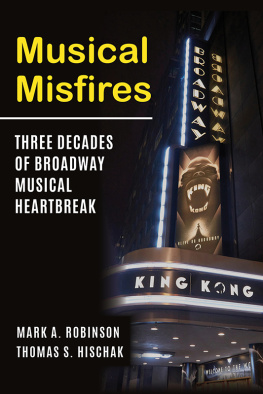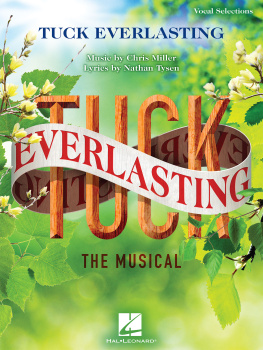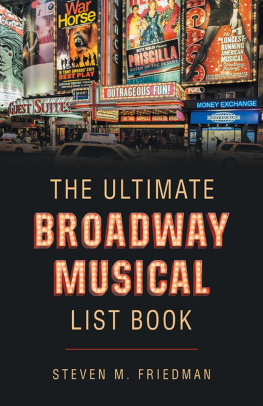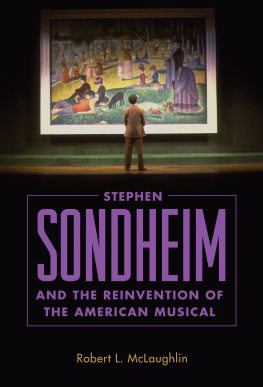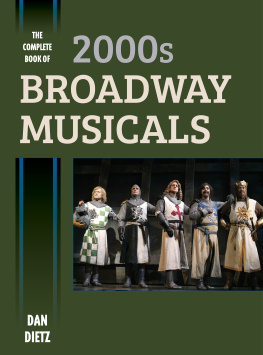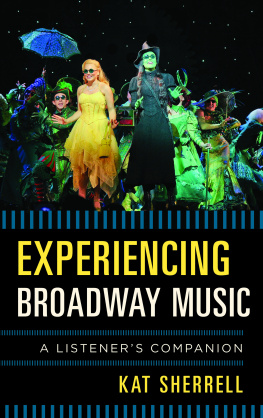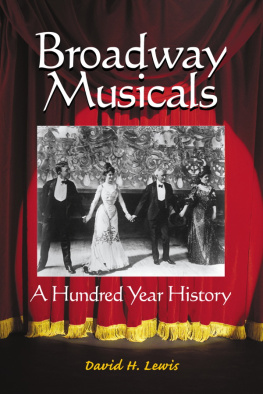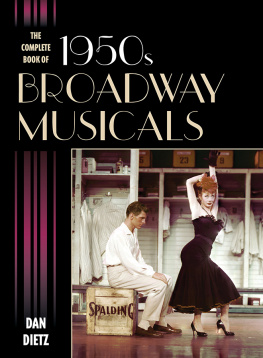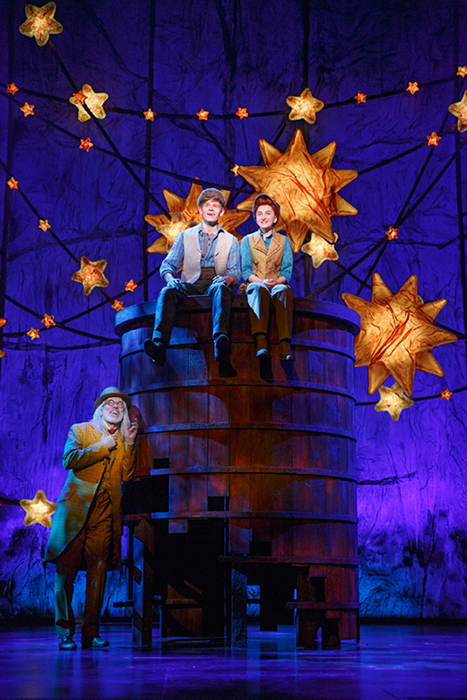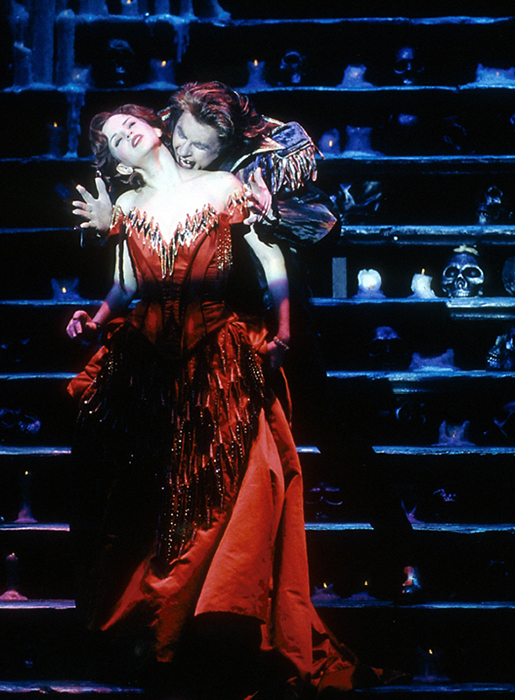Also by Mark A. Robinson and Thomas S. Hischak
The Disney Song Encyclopedia,
Also by Mark A. Robinson
The Encyclopedia of Television Theme Songs
Sitcommentary:
Television Comedies that Changed America
The World of Musicals:
An Encyclopedia of Stage, Screen, and Song
Selected Theatre Books by Thomas S. Hischak
Boy Loses Girl: Broadways Librettists
The Mikado to Matilda:
British Musicals on the New York Stage
The Off Broadway Musical Since 1919:
The Greenwich Village Follies to The Toxic Avenger
The Oxford Companion to American Theatre
3rd edition, with Gerald Bordman
The Oxford Companion to the American Musical:
Theatre, Film Television
Word Crazy: Broadway Lyricists: From Cohan to Sondheim
Musical Misfires:
Three Decades of Broadway Musical Heartbreak
BookBaby, Publishers
bookbaby.com
Copyright 2020 by Mark A. Robinson, Thomas S. Hischak
Publication date: September 2020
ISBN 978-1-0983293-1-0
Cover photo: Alamy Stock Photo
Cover design by Karen Hischak
bookbaby.com /bookshop
For Robbie Rozelle,
a font of musical theatre knowledge in his own right,
a true Broadway Baby, and the impetus behind this book.
His input, enthusiasm and feedback along the way have proven invaluable.
TUCK EVERLASTING (2016) Man in the Yellow Suit (Terrence Mann), Jessie Tuck (Andrew Keenan-Bolger) and Winnie Foster (Sarah Charles Lewis). Joan Marcus photo
Table of Contents
Acknowledgements
The authors wish to thank Derek, Todd and Howard at Photofest, Tony Award-winning photographer Joan Marcus, Ramona Pina at BookBaby, graphic designer Karen Hischak, theatre whiz Robbie Rozelle, and Cathy Hischak for so many things.
DANCE OF THE VAMPIRES (2002) Sarah (Mandy Gonzalez) and Count von Krolock (Michael Crawford). Photofest
Introduction
What Is a Musical Misfire?
When you sit down to write a book about Broadway musicals that didnt work (for one reason or another), it is not because you revel in their failure or enjoy taking on the role of ambulance chaser. In fact, you write a book like this because you are rooting for each and every show to succeed and feel a piece of the heartbreak when one doesnt. You write a book like this because you are a champion of the underdog, a standard-bearer for keeping the artistry and hard work that were poured into a misfire as alive for posterity as those who record the story behind critical darlings and runaway hits. It is with love and admiration for anything daring to make the difficult journey to the Great White Way that you examine and chronicle the story behind what we are calling musical misfires.
So what is a musical misfire exactly? In the past, Broadway musical fans and theatre historians would have called these shows flops. Forty or fifty years ago, it was usually (but not always) clear-cut which musicals were deemed a flop and which had been anointed successes. If critics tore a musical to shreds, the odds were very good that the audiences would not come, it would shutter relatively quickly, and the show would lose money. From this, a long line of legendary flops like Flahooley, Hazel Flagg, Jennie, Greenwillow, Darling of the Day, Mack and Mabel, King of Hearts, The Rink, and Grind would emerge. Today these titles are still remembered for components that stood out (usually their scores) despite the fact that the overall production didnt work or didnt run.
From the onset of the 1990s through the aborted 2019-2020 Broadway season and beyond, we simply cannot, in all fairness, continue to call shows that fail to run, do not make money, or cannot please the masses flops. Too many factors nowadays work against the steep, uphill climb toward success for a Broadway show. Economics have made it cost-prohibitive to keep a musical running with the hope it might catch on. If the show isnt an instant hit, then it is often doomed to failure. Even a well-reviewed musical has to run at capacity, sometimes for well over a year, before it can even dream of recouping its initial investment. Some shows are uniquely original, critically praised, and represent some of the best work there is in the musical theatre writing field, yet finding an audience for its commercial success is almost impossible because it is in a particular niche or not a crowd pleaser. That doesnt mean it flopped. There has also been a shift away from the critics having the sway they used to hold (for good and bad) and many shows survive instead by word-of-mouth and, in the last-decade or so, due to a strong social media presence. There just isnt that clear-cut definition of a flop anymore.
We have chosen the phrase musical misfires to encompass a wide-range of musicals that have opened on Broadway since 1989 that, for one reason or another, failed to meet all three components of that essential trifecta: audience acceptance, critical approval, and financial success. It doesnt suffice to use the word flop because, as you will see, there were many shows that ran for a very long time and lost money, or that critics adored but for which audiences failed to show up. Yes, some musicals were just plain problematic and serve as a reminder of what could not or would not work. Defining it a musical misfire simply suggests that a show was launched with great hope, brought some sparkle to the firmament, but didnt achieve everything it aspired to or what Broadway expected.
Why do we choose to begin with 1989? The American musical and the history of its hits, also-rans, and failures, have been well-documented up to this point, with many celebrated authors exploring the topic such as Stanley Green, Gerald Bordman, Ken Mandelbaum, Ethan Mordden, and Martin Gottfried. Since then, the story of the American musical has become more fragmented. Much of the old guard of composers, lyricists, book writers, directors, and choreographers have retired or passed away and the new guard has begun to establish its own voice. As we watch new talents take hold, documentation of their stories is only beginning to happen. We also chose the transition that happened circa 1990 because this was where the rules began to change. The mounting expenses of producing musicals on Broadway; the gentrification of Times Square and the Theatre District into a family-friendly, tourist destination; the decline of the all-powerful theatre critic; and the evolution of social media marketing around this time quickly saw Broadway transform into a very different place.
As we were writing this book we wished to explore the many outside factors that affect the success and failure of a Broadway musical. In the past, newspaper strikes, for example, were a deathblow to Broadway business, particularly for shows opening and getting no reviews, advertising, or other coverage. Today such a print media strike would have minimal effect on Broadway. There are still the occasional strikes by the actors and other labor unions, Stock Market fluctuations, and recessions. The aftermath of the attack on the World Trade Center and hurricane Sandy certainly had major but, thankfully, short-term impacts on Broadway. We considered these as we wrote about the musicals affected by such outside forces. But nothing prepared us for the possibility of Broadway going completely dark on March 12, 2020. The unprecedented devastation that the Coronavirus has had on all aspects of life around the world is overwhelming to behold. We have added a final chapter to this book about the Covid 19 effect on Broadway musicals and how successful shows might find themselves in the misfires category.

